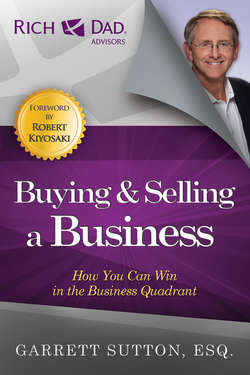Читать книгу Buying and Selling a Business - Garrett Sutton - Страница 30
На сайте Литреса книга снята с продажи.
Attorney
ОглавлениеA good attorney should be the first recruit for a buyer’s team. He or she will be intimately involved with every step of the buying process and you best be comfortable with that. You should have a personal rapport with your lawyer, a trust and respect that is reciprocated. Bringing your attorney on early in the game can save you costly mistakes. Small mistakes in the beginning of a venture can snowball out of control by the closing. An experienced lawyer can help you craft a strategy and guide you through the complicated process of business purchase. He or she may even be able to lead you to business opportunities.
This is not the time for generalists. Be sure your lawyer specializes in business sales and/or acquisitions and has an understanding of tax law (better yet, have an experienced tax attorney on your team as well as one familiar with business sales and acquisitions). While he or she may have gaps in expertise (business purchases/sales are complicated legal endeavors encompassing a variety of fields of law), they should be able to put you in contact with others who can fill those gaps. A lawyer whom you can trust and with whom you can comfortably communicate is the ideal.
One of the first documents to be prepared by your lawyer will be the letter of intent. This document outlines the buyer’s intention, but not legally binding obligation, to buy and the seller’s non-binding obligation to sell. The legally binding part of the document deals with confidentiality and competition. The buyer cannot disclose what he or she uncovers during investigation of the business. Nor can he or she use the letter to try and get a better a deal elsewhere. The letter of intent is the document that gets the whole transaction underway.
Once the letter of intent is signed, your attorney should begin the legal investigation of the business in question. If you are looking to buy (and remember, at this point you are only looking; no commitments have been made), your lawyer will check with the secretary of state or county clerk’s office (whichever is appropriate for the given jurisdiction) for any UCC-1 filings against the business. UCC-1 forms are filed by a lender when a loan is made and security interest in any assets is taken back. The form describes any assets in which the lender has an interest. You want to know if anyone has a primary interest in assets you are considering buying. Your lawyer can set up an escrow fund to cover potential claims.
Your attorney (or you, if you’re on a budget and know how to do it) will also check with the county clerk’s office for any liens against real estate and review zoning and business license and permit requirements. He or she will also assess any leases to be sure they are valid and can be transferred to you, as well as checking the status of any intellectual property or other proprietary information. He or she will review any lawsuits pending against the company. He or she can protect you from the former owner’s creditors. If you are considering a stock transfer rather than a purchase of assets, your lawyer should review the company’s bylaws, articles of incorporation, corporate minutes and stock transfer ledger to make sure the corporation you’re getting is clean.
A good attorney can also draft a non-compete provision to keep the seller from competing with your new acquisition. And he or she can ensure that the seller guarantees all statements regarding liabilities, creditors and accounts receivable.
Your attorney should also be in contact with the other side’s lawyer. When the deal has progressed, it is generally the buyer’s lawyer who prepares the purchase agreement. Some buyers and sellers let their lawyers do the negotiations. There are pros and cons to this approach, as will be discussed later.
The final terms of purchase will be set with the help of your lawyer. And he or she will set up conditions so that once the agreement is signed, the seller will continue business as usual in order to aid a smooth transition for you, customers, creditors, employees and suppliers.
The attorney is your source for legal advice (at a cost ranging from $150 to sometimes over $400 per hour). But your attorney should not be making business decisions for you. In fact, unless he or she is an experienced businessperson, they won’t likely be qualified to give you business advice. Know always that legal advice does not always constitute good business advice. For example, given the potential for product liability claims, who would ever bring a new product to market? Certainly not the lawyers. Thankfully, the market does not operate that way. Society would surely suffer and stagnate if all decisions were based solely on legal advice. No one would take a risk on anything. Indeed, some entrepreneurs seem to pay for high-priced legal advice so that they can gleefully ignore it and go with their gut. And so it is important for you to appreciate the difference between business and legal advice – that legal advice supplements and supports good business advice, and not vice-versa. In this realm, don’t ever let the tail wag the dog.
A frequently asked question has to do with when should the lawyer be contacted. There is no one set or standard answer. Some will contact a lawyer at the letter of intent stage, others when it is time to prepare a buy/sell agreement. But you may need a lawyer before those thresholds. The important point to remember is that when you sense that you are getting in over your head, or just that you need independent and reasoned advice, it may be time to contact an attorney. At whatever point that is, don’t be afraid to do so.
